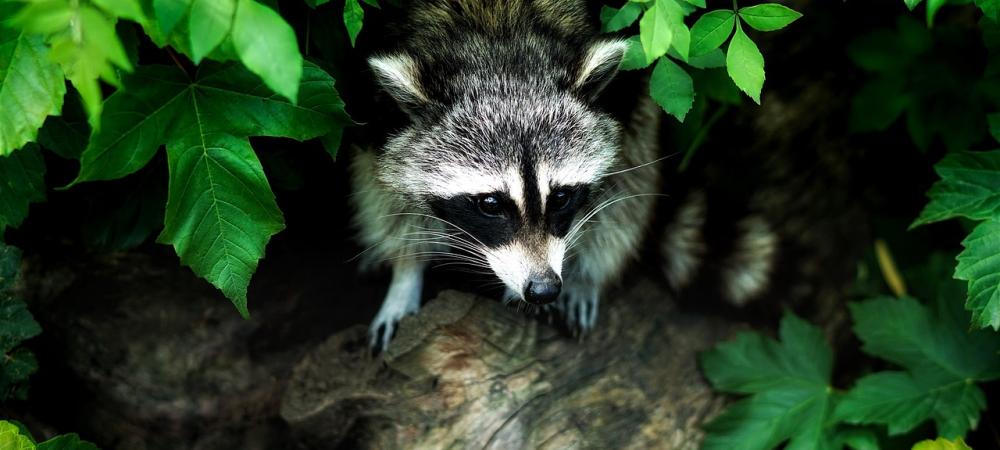What to Do If You Have a Raccoon in Your Yard

Raccoons are intelligent and resourceful creatures that can be charming to observe from a distance. However, when they decide to invade your yard, they can become a nuisance. In South Carolina, where suburban neighborhoods meet natural habitats, raccoons often venture into backyards in search of food and shelter. If you find a raccoon in your yard, here’s a detailed guide on how to encourage it to leave, manage the situation, and prevent future encounters.
1. Assess the Situation
Before taking action, it’s important to observe the raccoon’s behavior. Raccoons are primarily nocturnal and are more active at night. If you see one during the day, it could indicate illness or food scarcity. Here are some signs to look for:
- Tacks look like small, hand-like tracks in mud or soft soil
- Droppings that resemble cylindrical pellets, often with seeds and fur visible.
- Check for disturbances in your garden, overturned garbage cans, damaged bird feeders, or chewed furniture.
- Raccoons may seek shelter in attics, garages, or under decks. Listen for noises, especially at night, which may indicate nesting.
If the raccoon appears healthy and is just passing through, there are ways to encourage it to leave.
2. Remove Food Sources
Preventing Raccoon Attraction:
The first step in dealing with a raccoon is to eliminate the things attracting it to your yard. Here are detailed actions to take:
- Secure Garbage Cans: Use sturdy, lockable trash bins designed to withstand raccoon tampering. You can also place heavy objects on top of cans or use bungee cords to secure the lids. Store trash cans in a garage or shed, if possible, especially on nights when trash is not collected.
- Remove Pet Food: Avoid feeding pets outdoors. Instead, feed pets instead and avoid leaving food out overnight. Pet food should be stored indoors, preferably in airtight containers, to prevent odors from attracting raccoons.
- Clean Up Fallen Fruit: If you have fruit trees in your yard, regularly inspect and pick up fallen fruit from trees or shrubs, as ripe fruit is a raccoon favorite. Consider harvesting fruit early if raccoons are a frequent issue.
- Seal Off Bird Feeders: Consider bringing bird feeders inside at night or using raccoon-resistant feeders.
- Secure Compost Bins: Raccoons are drawn to compost piles. Use bins with tight-fitting lids or compost in sealed containers. You should generally avoid composting meat, dairy, or oily foods that can attract raccoons.
3. Create an Unwelcoming Environment
Making your yard less hospitable to raccoons can encourage them to move on. Here are some effective strategies:
- Use Scents: Raccoons dislike strong smells. You can use predator urine (available at garden centers) to create a natural deterrent. Other effective scents include vinegar, cayenne pepper, and citrus peels. Scatter these around the yard, particularly in areas where raccoons are frequent visitors.
- Install Motion-Activated Sprinklers: These devices detect movement and release a burst of water, startling raccoons and other animals. They can be effective at night when raccoons are most active.
- Sound Deterrents: Consider using a radio or a motion-activated noise device. Sounds of human voices or loud music can scare raccoons away.
- Bright Lights: Raccoons prefer dark environments. Using motion-activated lights around your yard can disrupt their nighttime activities.
4. Fencing Solutions
If raccoons frequently invade your yard, a physical barrier, like a fence around the perimeter, may be necessary. Here’s how to build an effective fence:
- Height and Structure: A fence should be at least 4-6 feet high. A solid wood or chain-link fence is most effective—avoid fences with gaps that raccoons can squeeze through. To prevent climbing, consider angling the top of the fence outward (a "flared" design).
- Buried Bottom: To deter digging, bury the fence at least a foot deep or extend a wire mesh underground.
- Maintain Your Fence: Regularly check for gaps or weaknesses, particularly after storms or heavy winds, and repair as necessary.
5. Know When to Call for Help
While many raccoons may leave with the right strategies, some situations require professional assistance:
- Sick or Injured Raccoon: If a raccoon appears sick (disoriented, excessive drooling, etc.), call a wildlife control expert or local animal control. Sick animals can pose health risks. In South Carolina, the South Carolina Department of Natural Resources (SCDNR) provides resources and guidelines for managing wildlife.
- Raccoon Dens: If you suspect raccoons are nesting in your attic or under your home, contact a professional pest control company, like Natural Roots Pest Control & Wildlife Removal, for humane raccoon removal and to seal entry points.
In South Carolina, raccoons are protected under state law. Trapping and relocating them without a permit can be illegal. Always consult wildlife professionals who are familiar with wildlife laws, local regulations, and best practices.
Getting Rid of Raccoons
Dealing with raccoons in your yard can be a challenging experience for homeowners in South Carolina. By understanding their behavior, removing attractants, creating an unwelcoming environment, and knowing when to call for help, you can manage and prevent these clever critters from making your yard their home.
If you ever find yourself overwhelmed or unsure about how to handle a raccoon situation, don’t hesitate to reach out to local wildlife control experts. With the right approach, you can keep your yard raccoon-free and enjoy the beauty of South Carolina’s wildlife from a safe distance.
